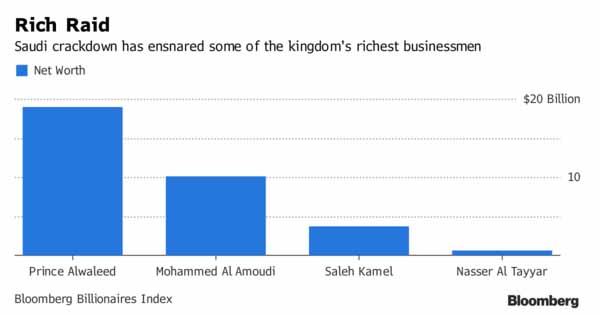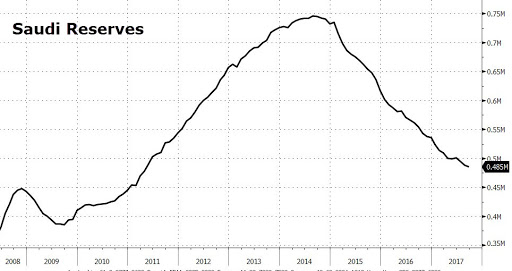From the very beginning, there was something off about Sunday’s unprecedented countercoup purge unleashed by Mohammad bin Salman on alleged political enemies, including some of Saudi Arabia’s richest and most powerful royals and government officials: it was just too brazen to be a simple “power consolidation” move; in fact most commentators were shocked by the sheer audacity, with one question outstanding: why take such a huge gamble? After all, there was little chatter of an imminent coup threat against either the senile Saudi King or the crown prince, MbS, and a crackdown of such proportions would only boost animosity against the current ruling royals further.
Things gradually started to make sense when it emerged that some $33 billion in oligarch net worth was “at risk” among just the 4 wealthiest arrested Saudis, which included the media-friendly prince Alwaleed.

One day later, a Reuters source reported that in a just as dramatic expansion of the original crackdown, bank accounts of over 1,200 individuals had been frozen, a number which was growing by the minute. Commenting on this land cashgrab, we rhetorically asked “So when could the confiscatory process end? As we that some $33 billion in oligarch net worth , the ruling Saudi royal family has realized that not only can it crush any potential dissent by arresting dozens of potential coup-plotters, it can also replenish the country’s foreign reserves, which in the past 3 years have declined by over $250 billion, by confiscating some or all of their generous wealth, which is in the tens if not hundreds of billions. If MbS continues going down the list, he just may recoup a substantial enough amount to what it makes a difference on the sovereign account.”

Then an article overnight from the WSJ confirmed that fundamentally, the purge may be nothing more than a forced extortion scheme, as the Saudi government – already suffering from soaring budget deficits, sliding oil revenues and plunging reserves – was “aiming to confiscate cash and other assets worth as much as $800 billion in its broadening crackdown on alleged corruption among the kingdom’s elite.”













Leave A Comment